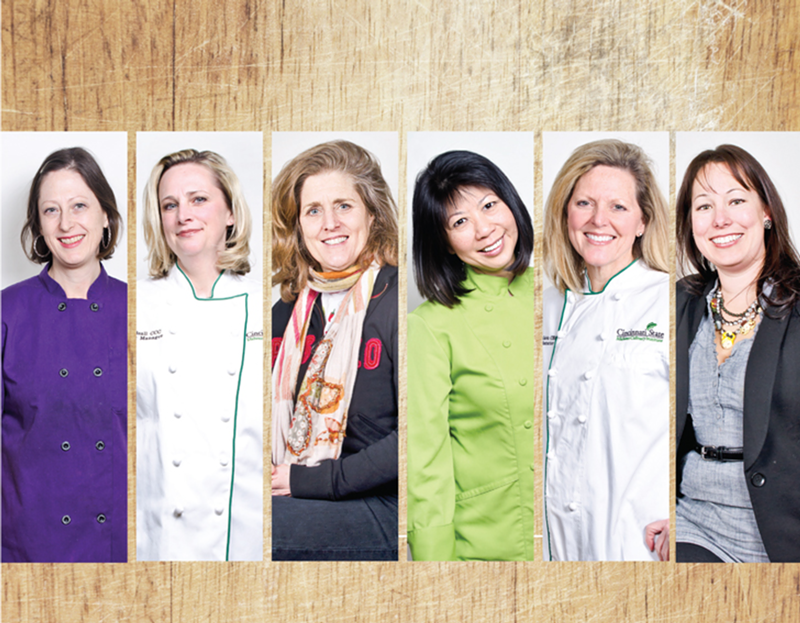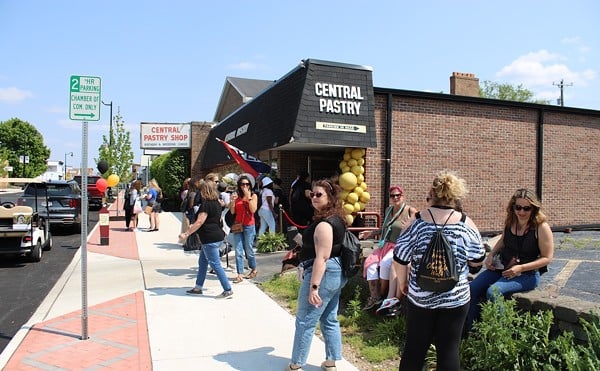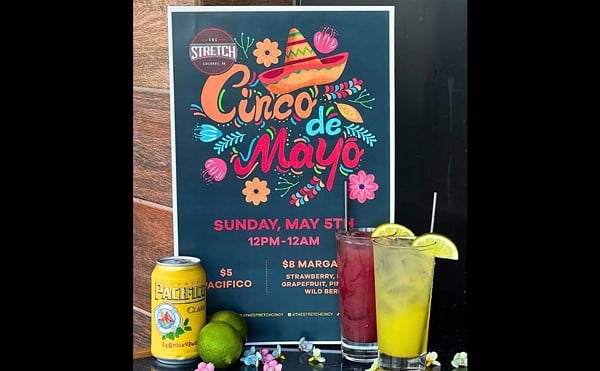W
hen Time magazine published its “Gods of Food” story last fall, it featured the magazine’s short list of the people who influence what you eat — chefs, farmers, activists, bureaucrats and businessmen who “help determine what goes on your plate or in your cup,” the magazine says — along with a resplendent cover shot of international superstar chefs David Chang (of the Momofuku restaurant group), René Redzepi (co-owner of Denmark’s Michelin-starred Noma) and Alex Atala (chef at world-renowned São Paulo restaurant D.O.M.). But one thing was blatantly missing: the goddesses. Out of a list of 13 influencers, only four were women, none of them chefs. (Time’s female “gods” were Amrita Patel, of India’s cooperative milk industry; Aida Batlle, a coffee grower in El Salvador; Vandana Shiva, a physicist against big agriculture; and Ertharin Cousin, head of the U.N. World Food Programme.
Where were all the superstar female chefs? The responses to the article came quickly and rightfully screamed of sexism. After all, there was no Julia Child or Alice Waters, not to mention any of the hundreds of other groundbreaking female chefs worldwide.
In a follow-up interview with Eater.com, Time’s editor Howard Chua-Eoan, who created the list, defended the magazine’s choice to omit female chefs by stating the qualifiers, which were used to define the term “influence.”
“We went with the chefs with the most name recognition and the hot restaurants at the moment,” he said. “I think there were various other factors as well. But there was no attempt to exclude women, we just went with the basic realities of what was going on and who was being talked about.”
“It’s all men because men still take care of themselves,” he continued. “The women really need someone — if not men, themselves actually — to sort of take care of each other.”
The issue of gender politics in the kitchen could be rehashed ad nauseam, but instead we decided to bring the conversation local and focus on our own definition of the word “influence” — not media-driven information or popularity contests, but strong Cincinnati women who go about their business on a day-to-day basis running professional kitchens, educating the next generation of chefs, raising families and, for the most part, quietly influencing what you eat.
Julie Francis
At the age of 24, Julie Francis entered the restaurant industry as a waitress in a fine dining restaurant in Denver, Colo., the hometown of her husband, Patrick Nulty, a dancer with Ballet Arizona. A Cincinnati native, Francis had been raised in a family with a keen interest in food and wine, and when a position opened up as a cook on the cold line, where the executive chef was also a woman, Francis asked to be transferred into the kitchen. She worked her way up the line in restaurants in Denver, Albuquerque, N.M., and Santa Fe., N.M.
With hopes of eventually opening her own restaurant, Francis returned to Cincinnati and worked as Chef de Cuisine at Trio in Kenwood until opening Aioli downtown, which she owned and operated for five years. In 2006, she opened Nectar, the Mount Lookout Square restaurant known for its seasonally driven cuisine as well as its acclaimed Dinner Club, a monthly series featuring a specific theme or ingredient. Next month Francis will join a small group of elite Cincinnati chefs to cook a meal at the renowned James Beard Foundation in collaboration with “Cincy in NYC.”
Francis’ feelings on the Time article are mixed. “While all the people on the list are important and interesting, it is just such an obvious omission to not include a woman chef,” she says. “The author keeps saying that he didn’t want to just ‘fill a quota’ in regard to including women chefs, and that the women he considered, like Alice Waters or Anita Lo, provide ‘inspiration’ but are not ‘influential.’ I think his standard of value for women chefs is commerce-driven, and that he really has no knowledge of the importance and role of women chefs in today’s restaurant world. ... The article propagates the myth of the restaurant world being a ‘boys club.’ ”
As for whether gender has ever had an impact on her career, personally, Francis says, “I don’t really think gender has hindered me in any way — sure, some of my restaurant experiences had either co-workers or management that didn’t appreciate or promote women, but these are the places you quit working for. I have been lucky that I have been allowed to have success through my skills as a chef.”
Grace Yek
Grace Yek is an assistant professor in the Culinary Arts and Science program at the University of Cincinnati and an adjunct chef instructor at the Midwest Culinary Institute at Cincinnati State and Art Institute of Cincinnati. Yek is a certified Chef de Cuisine with the American Culinary Federation and a recognized speaker and writer on topics like food trends, ethnic foods and flavors and the application of science in cooking.
“I can’t help but get the impression the Time editor was listening for who had the loudest ‘clang’ of the moment,” Yek says. “By and large, female chefs — even the best ones — don’t make a lot of noise.”
Yek didn’t take Time’s article too seriously, but she did take exception to the fact that chef Alice Waters was left out. For four decades, Waters has been at the forefront of the fresh food movement and is widely seen as the pioneer of California cuisine.
“Alice Waters showed us what a sustainable food economy looked like,” Yek says. “Her philosophy on fresh, local and quality ingredients has percolated to countless other chefs. ... She has also transformed the way kids eat in school through programs like The Edible Schoolyard and the School Lunch Initiative. More than 25 years ago when Bill Shore, the founder of Share our Strength, sent out 2,000 letters inviting chefs and restaurateurs to join his fight against hunger, he received only one reply — from Alice Waters. If the criteria is to look for culinary figures who are the most influential in the world of food, then why is Alice Waters not on the list?”
Meg Galvin
Most people would consider chef Meg Galvin to be a morning person. “I would much rather be running the streets for a jog at 5 a.m. than sleeping. That means I get to bed early. If I had stayed in the industry, the chances of getting to bed early most nights would not happen.”
As a chef instructor at The Midwest Culinary Institute as well as an adjunct professor at the University of Cincinnati, she’s able to combine her career and family life. After business and culinary school in Europe, she moved back to the United States where her first position was as an executive chef at a country club, which she eventually general managed for seven years. She moved to Cincinnati to cook at the Shriners Hospitals for Children’s burn center. After a seven-year stint there, she went into education.
Galvin credits her time spent teaching students with “keeping her young.” When it comes to advice regarding gender in the kitchen for her students, Galvin tells them, “I have not allowed it to play a role in my career, but I do see it happen to some young female cooks. I encourage them to be strong and work toward a positive path. When they go for an interview and the employer says, ‘You are much too pretty to be in the kitchen. How about I give you a position in the front of the house?’ I tell them to walk out. Funny thing, this has happened to several students and the interviewer was a woman.”
Lilly Burdsall
Chef Lilly Burdsall is the purchasing and facility manager at the Midwest Culinary Institute. After years of working in restaurant kitchens, she gave up cooking professionally in 2006 to go into education and finally management as a way to balance both career and family.
“As far as women chefs in the local scene,” she says, “they are instrumental and influential.”
Burdsall goes back 20 years, when she trained under Anita Hirsch Cunningham, who was breaking ground during the late 1990s by buying as much local produce as possible.
“Anita has been out of Cincinnati for a long time,” Burdsall says, “but her legacy and protégées are everywhere. She was amazing. She worked hard. And she taught me that if you want to succeed as a small, female chef, you have to work twice as hard and be twice as good. When I was in my early- to mid-twenties, I took that as a full-on challenge, and I did those things, and I was good. And I had the respect of my cohorts.”
Burdsall says that family life wasn’t really a consideration when she quit cooking professionally, but that she realized she was missing a lot of her own life while cooking for scores of strangers.
“I took a long, hard look at where I was and ultimately decided to go into education,” she says. “Life’s strange circumstances eventually brought me to culinary education and it’s the perfect fit for me. And while my career at Cincinnati State has evolved over time, I still feel so at home and happy being surrounded by steel, fire and knives every day. I love knowing and advocating for students, and I do as much as I can for the female students who often come to me needing an advocate.”
Suzanne Deyoung
Suzanne Deyoung was born to Cincinnati culinary royalty. Her father, Pierre Adrian, was recruited from Alsace, France to cook in the U.S., where he earned Cincinnati’s Maisonette its first five-star rating as the restaurant’s head chef. It was during her schooling in France that Deyoung first experienced chauvinism.
“I remember the surprise of one particular French kitchen crew seeing a woman working in the traditionally male-dominated restaurant kitchen. They also decided that I must be gay, otherwise I would be working in the front of house,” she says. “My reply: ‘Je suis ici pour apprendre, comme vous tous.’ I am here to learn, just like you.”
After completing her culinary training at France’s five-star L’Auberge de I’lll in Alsace and returning home, Deyoung and her sister Michele Vollmann opened a small boutique catering company in Madeira and named it La Petite Pierre, in honor of their father. A family affair, Deyoung’s husband Robin put aside his own career as a self-employed contractor/remodeler to help with the company, and her sons have been washing dishes since they were tall enough to reach the sprayer.
For Deyoung, cooking wasn’t really a choice. “I am one of four professional chefs within two generations of my family,” she says. “One was head chef of the Union Club in New York City from the 1950s to the early 1970s. Another was the head chef of the New York Sheraton Netherlands. Between my father and all that food in my history, what else was I supposed to pursue? ... Cooking is in my blood.”
Deyoung is currently moving on to the next chapter in her life. She’s leaving La Petite Pierre in Vollman’s hands to open La Soupe (lasoupecincinnati.com), a new restaurant in Newtown with a charitable bent.
“In the spring, I will launch La Soupe,” she says, “a French roadside soup shack with a special mission. People can drop in for old-fashioned soups, chilis, gumbos and other bowl-friendly entrées. When families bring home soup from La Soupe they are making it possible for me to donate portions of the same great soups to people who truly need it. The idea has been brewing for years and I am finally ready to make it happen.”
Deyoung will be working with Northern Kentucky University business students, and although La Soupe is a for-profit venture, she’ll be donating a bowl of soup to a shelter in need for every quart she sells in the restaurant.
Renee Schuler
When chef Renee Schuler opened her catering company eat well celebrations and feasts in 2005 as a single woman, it was most definitely with an eye toward her future and building a business that could support the family she might someday raise.
When planning catering menus for eat well events, Schuler leans toward light food that won’t weigh folks down at a party, causing them to feel less “sexy,” and gleans ideas from what’s in season as well as local restaurant dishes.
“I start with seasonal and trend inspiration from new and cherished cookbooks, magazines and dining out at great restaurants out of town and in our fair city like Salazar, Abigail Street, Zula, the Anchor, The Eagle, and more,” she says. “I also always have in mind ingredients that will be in season and new finds, like the micro greens at Waterfields we just started using. I really want to take catering to the next level, in all aspects.”
Schuler sees gender roles in the workplace to be in a state of flux.
“It seems to me that the relationship between men and women in the workplace is a very hot topic for discussion right now, and I think there are obviously changes as we go through the generations,” she says. “The restaurant industry is in the limelight right now and has been and chefs are on trend, particularly restaurant chefs, because of the Food Network and everyone likes to talk about them.”
As for the Time article, Schuler laughs off the haughty heading: “The title of the Time magazine article alone, ‘The Gods of Food.’ I mean, at the end of the day, it’s just food. It’s a for-profit business. Those guys are making tons of money. At the end of the day those guys aren’t defending our country and some of those things that require sacrifice.” ©






